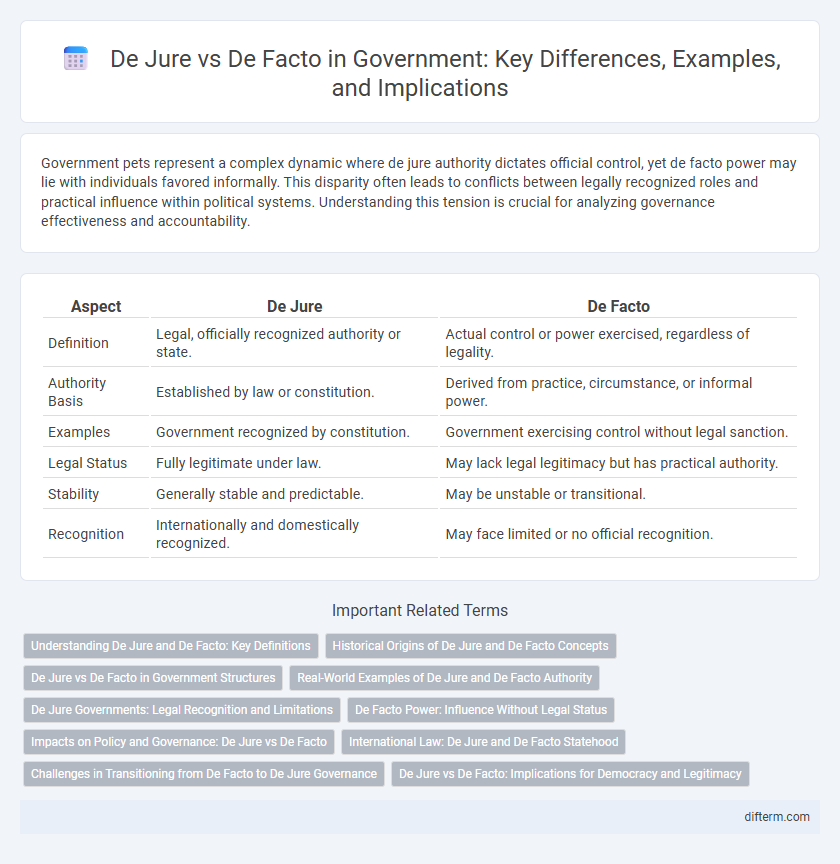Government pets represent a complex dynamic where de jure authority dictates official control, yet de facto power may lie with individuals favored informally. This disparity often leads to conflicts between legally recognized roles and practical influence within political systems. Understanding this tension is crucial for analyzing governance effectiveness and accountability.
Table of Comparison
| Aspect | De Jure | De Facto |
|---|---|---|
| Definition | Legal, officially recognized authority or state. | Actual control or power exercised, regardless of legality. |
| Authority Basis | Established by law or constitution. | Derived from practice, circumstance, or informal power. |
| Examples | Government recognized by constitution. | Government exercising control without legal sanction. |
| Legal Status | Fully legitimate under law. | May lack legal legitimacy but has practical authority. |
| Stability | Generally stable and predictable. | May be unstable or transitional. |
| Recognition | Internationally and domestically recognized. | May face limited or no official recognition. |
Understanding De Jure and De Facto: Key Definitions
De jure refers to laws and official policies that are legally recognized and enforced by government institutions, establishing formal authority and rights. De facto describes situations or conditions that exist in practice, regardless of legal status or official recognition. Understanding the distinction between de jure and de facto is essential for analyzing governance, legal compliance, and social realities within political systems.
Historical Origins of De Jure and De Facto Concepts
The concepts of de jure and de facto have historical origins rooted in Roman law, where "de jure" referred to rights and status recognized by law, and "de facto" described situations existing in reality without legal recognition. These distinctions evolved through medieval European legal traditions to differentiate between lawful authority and practical control or governance. Understanding these origins clarifies modern applications in government, law, and political science where de jure authority signifies legal legitimacy, while de facto power reflects actual influence or control.
De Jure vs De Facto in Government Structures
De jure government structures are those established by law or formal constitution, representing the legally recognized authority within a state. In contrast, de facto government structures exist in practice, often exercising power without legal legitimacy or formal recognition, such as transitional or military regimes. Understanding the distinctions between de jure and de facto authorities is essential for analyzing legitimacy, governance effectiveness, and international relations.
Real-World Examples of De Jure and De Facto Authority
De jure authority refers to power that is legally recognized by official laws or constitutions, exemplified by elected leaders like the President of the United States who holds office through democratic processes. De facto authority exists when individuals or groups exercise control in practice without formal legal recognition, such as revolutionary movements that govern territories before gaining legal legitimacy, like the Taliban's control in Afghanistan prior to international recognition. These distinctions highlight the complexity of governance where legal legitimacy and practical control may diverge.
De Jure Governments: Legal Recognition and Limitations
De jure governments possess formal legal recognition by constitutions, international bodies, and treaties, establishing their authority as legitimate and binding. This legal status ensures access to diplomatic relations, international aid, and participation in global institutions but often limits their immediate control over territories or populations in de facto terms. Despite such recognition, de jure governments may face challenges enforcing laws and policies when opposed by rival de facto authorities or internal insurgencies.
De Facto Power: Influence Without Legal Status
De facto power refers to the actual influence or control exercised by an individual or group without formal legal authority or recognition within a government structure. This type of power often emerges through social, political, or military dominance that shapes decision-making and policy implementation despite the absence of official status. Examples include military juntas governing a country without constitutional legitimacy or informal political leaders who drive policy behind the scenes.
Impacts on Policy and Governance: De Jure vs De Facto
De jure governance establishes legal frameworks that guide official policy-making, ensuring consistency and legitimacy within government institutions. In contrast, de facto governance reflects the actual power dynamics and practices on the ground, which may diverge from formal laws, influencing policy implementation and effectiveness. Understanding the interplay between de jure statutes and de facto realities is crucial for crafting responsive and pragmatic governance strategies.
International Law: De Jure and De Facto Statehood
De jure statehood refers to the legal recognition of a government or territory by international law, granting it sovereign status under treaties and diplomatic protocols. De facto statehood exists when a government exercises effective control over a territory and population without formal legal recognition by other states or international organizations. International law differentiates these statuses to address issues of legitimacy, sovereignty, and the enforcement of rights and obligations between recognized and unrecognized entities.
Challenges in Transitioning from De Facto to De Jure Governance
Transitioning from de facto to de jure governance involves complex challenges, including legal recognition, institutional legitimacy, and the establishment of formal authority frameworks. Governments must navigate conflicting power structures, potential resistance from entrenched interests, and the need for comprehensive legal reforms to solidify de jure status. Ensuring inclusive political processes and building public trust are critical to overcoming obstacles in formalizing governance under constitutional and international law standards.
De Jure vs De Facto: Implications for Democracy and Legitimacy
De jure governance refers to authority established by law and codified in constitutions, while de facto power is exercised in practice regardless of legal recognition. The tension between de jure and de facto rule profoundly affects democracy by shaping the legitimacy of government institutions and influencing citizen trust in political processes. Understanding this distinction is crucial for assessing the stability and authenticity of democratic systems worldwide.
De jure vs De facto Infographic

 difterm.com
difterm.com